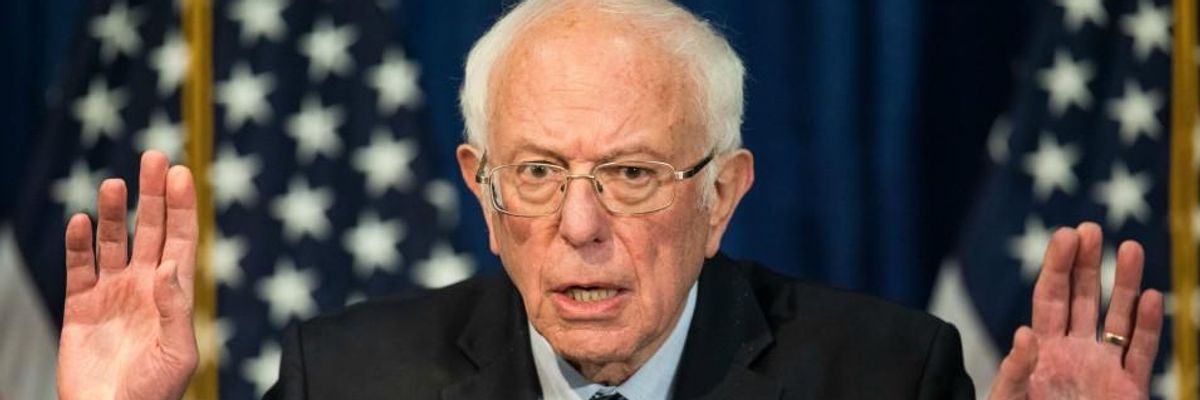Sen. Bernie Sanders on Thursday responded with outrage and a demand for reform after a new federal analysis revealed that Medicare Part D, which is utilized by tens of millions of Americans, pays far more for prescription medications than any other government health program.
"It is time for Congress to take on the greed of the pharmaceutical industry and require Medicare to negotiate lower drug prices."
--Sen. Bernie Sanders
Sanders (I-Vt.) commissioned the new Congressional Budget Office (CBO) report on Medicare Part D, an optional prescription drug benefit for people with Medicare that is provided through private insurers. The majority of those with Medicare are enrolled in a Part D plan.
The CBO analysis focused on the prices of 176 top-selling brand-name drugs and found an average net price of $343 for Medicare Part D. That compared with $118 for Medicaid, $190 for the Department of Veterans Affairs, $184 for the Department of Defense, and $272 for the DoD TRICARE retail pharmacy network.
The report noted that "the much lower net prices in Medicaid are the result of higher manufacturer rebates in that program than in Medicare Part D." For specialty drugs, the average price ranges from $1,889 in Medicaid to $4,293 in Medicare Part D.
"There is no rational reason why Medicare pays nearly three times more than Medicaid and about twice as much as the VA for the same exact medicine," Sanders declared.
"Negotiating directly with pharmaceutical companies will substantially reduce the price of prescription drugs, and it is a national embarrassment that the secretary of Health and Human Services is prohibited from doing that on behalf of the more than 40 million Americans who get their prescription drug coverage from Medicare Part D," he added. "It is time for Congress to take on the greed of the pharmaceutical industry and require Medicare to negotiate lower drug prices."
The CBO report follows the January release of a Government Accountability Office (GAO) study, also commissioned by Sanders, which found that in a "sample of 399 brand-name and generic prescription drugs, the VA paid an average of 54% less per unit than Medicare, even after taking into account rebates and discounts."
The GAO study, which involved 2017 data, revealed that the VA paid at least 50% less for 233 of the medicines and at least 75% less for 106 of them.
Sanders has repeatedly taken on the pharmaceutical industry with legislative proposals. In 2018, he and Rep. Ro Khanna (D-Calif.) unveiled the Prescription Drug Price Relief Act, which Social Security Works called "Big Pharma's worst nightmare."
Highlighting that legislation in response to the CBO report, Sanders' office said Thursday that the bill "would cut prescription drug prices in half by pegging prices in the United States to median drug prices in five major countries: Canada, the United Kingdom, France, Germany, and Japan."
Medicare coverage is generally restricted to people age 65 or older, younger people with disabilities, and those with permanent kidney failure requiring dialysis or transplant--but Sanders has long advocated for Medicare for All.
Last week, a panel of policy experts and medical professionals who examined the healthcare legacy of the Trump administration released a report stating that its policies did not "represent a radical break with the past but have merely accelerated the decadeslong trend of lagging life expectancy that reflects deep and long-standing flaws in U.S. economic, health, and social policy."
They concluded that "single-payer, Medicare for All reform is the only way forward."

